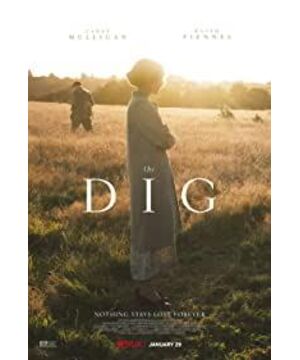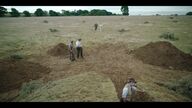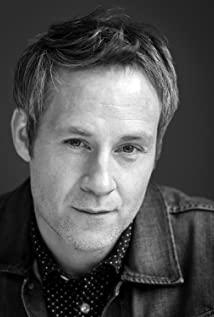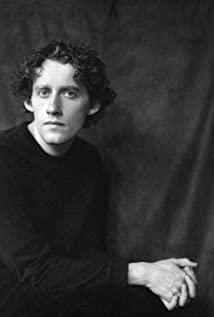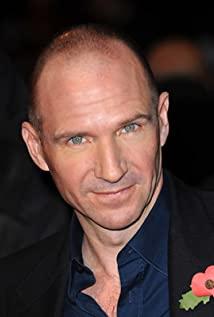"The dig" is the work of a post-80s director who was born in Basel and grew up in Cambridge, Melbourne. This can be felt from the director's lens. The wilderness, farmhouse, mansion, sky and dry grass under his lens are very Melbourne, and I like it after watching a few shots. I don’t know if the rain he took is very British. These two starring actors are actors I like very much: Ralph Fiennes, Carrie Mulligan
This is a very simple story. On the eve of World War II, a young wealthy widow Edith bought a large piece of land and manor, just to excavate a few ancient tombs in the manor. She invited Mr. Brown, the best digger in the area. Mr. Brown was also very interested in this ancient tomb. After several twists and turns, they dug up an ancient ship-of course the ship had already turned to ashes, but the soil was darker in color. Based on family experience, Mr. Brown traced the shape of an ancient ship. They are very excited. Edith has loved archaeology since he was a child, and so does Mr. Brown. Edith is a woman and cannot receive a formal education. Love, they did a great job.
At this time, the British Museum found out, took a professional archeological team, and (forcibly) took over the excavation work, because the cultural relics are state property and cannot be disposed of by private individuals even on private land. Mr. Brown quit with anger, but finally couldn’t help but join in. With the archaeological team, the archaeological team completely excavated this ancient tomb, pushing the cultural history of Britain forward for hundreds of years. In fact, Edith has been suffering from congenital heart disease. Finally, on the eve of the war, they completed the excavation. Edith also agreed to donate the cultural relics to the British Museum (but she emphasized that Mr. Brown was indispensable). Later, the cultural relics were preserved during the war and were not bombed by Germany. Edith died of illness Three years later, these cultural relics were exhibited in the British Museum for the world to visit.
This is just a bland story, but it expresses the British spirit and British culture vividly, past, present, and future in this remote village. The more typical feature in British culture is the gentleman spirit, which is manifested in personal life as being as decent as possible under any circumstances, and in the sense of responsibility and sacrifice under the feelings of family and country. This little story is like a drop of water, reflecting the gentleman's spirit in the opposition, ranging from a three-piece suit of Mr. Brown at the beginning, to a large cousin Edith being called to the air force to die. Mr. Brown’s job is to dig a grave, take a ferry ride to this small village, and then ride a bike on a rough country road, but he wears meticulously. The shot of Liang crossing the river with the bicycle on the ferry boat is far and away. close. Later, I talked to Edith about whether his wages were not humble or overbearing, and the unbearable anger and regret after being taken over by the British Museum, were all impressive.
When they talked and said that Mr. Brown did not have a diploma, Edith directly said to the head of the excavation team sent by the British Museum that you are too Snobbish to say that. This straightforward sentence left a group of "experts" speechless. In the end, she praised Mr. Brown for his contributions in front of the media at the donation ceremony. Mr. Brown was grateful for this. He walked over and thanked him. The trust and understanding between the two eyes met in no words-not too sensational, implicit and deep tacit, which is exactly the British culture. Nature.
The movie talks about a few love stories by the way. Edith’s husband has passed away. Their love was expressed during her visit to her husband’s cemetery and her chat with Mr. Brown. We can feel her love for him and his tolerance for her. Understanding and support (in the age when women can't get a normal education) are also manifested in their common children. Mr. Brown, the old couple, are more respectful. She writes a letter to him every day and he has no time to open it. She said that when you are not around, I will read the book you wrote. He said: Ah, that book is not easy to read. The focus is on the love between Rory, Edith’s cousin, and Peggy, the only female scholar on the archaeological team. The newly married Peggy gradually discovers that her husband is gay and his lover is in the same archaeological team. Rory's filming and excavation work from the side began to love Peggy, the passionate and innocent Peggy, but he knew that he had been drafted into the army to join the Air Force, and he was very likely to die on the battlefield. The love between them was deep, but the love came to nothing. Until Peggy found out his homosexuality from her husband (she said, I have seen your happiness, we all know it), in that era when homosexuality was a crime, she did not speak bluntly, but did not choose to continue to be a same wife.
This film is a film about choice. Edith chose Mr. Brown to preside over the excavation. In the end, he chose to donate the cultural relics to the British Museum instead of the local museum (for more people to visit). Rory knew that the application was dead and still kissed goodbye and just got acquainted. Lover went to the battlefield. Mr. Brown knew that he had no academic qualifications and no status. In this excavation, he must have been submerged and insignificant. He still chose to assist in the excavation because of his love, and let his discoveries be handed over to others. These choices are all struggling, and the process of this struggling is where the soul of a nation lies. Decades later, the truth finally came under the broad daylight, and Mr. Brown was admitted. This batch of cultural relics tells the choice of the British and the long history of civilization of the British Empire. In the history of British archaeology, this may be just an anecdote. It is just the choice of a group of ordinary people. It is not vigorous, but it is this little thing, every ordinary person, that has created the most glorious civilization of mankind. In the past, the British laughed at the United States. Nouveau riche, no demeanor, no history, no culture, I always don't understand it very much, but in recent years, I have slowly understood it.
View more about The Dig reviews


